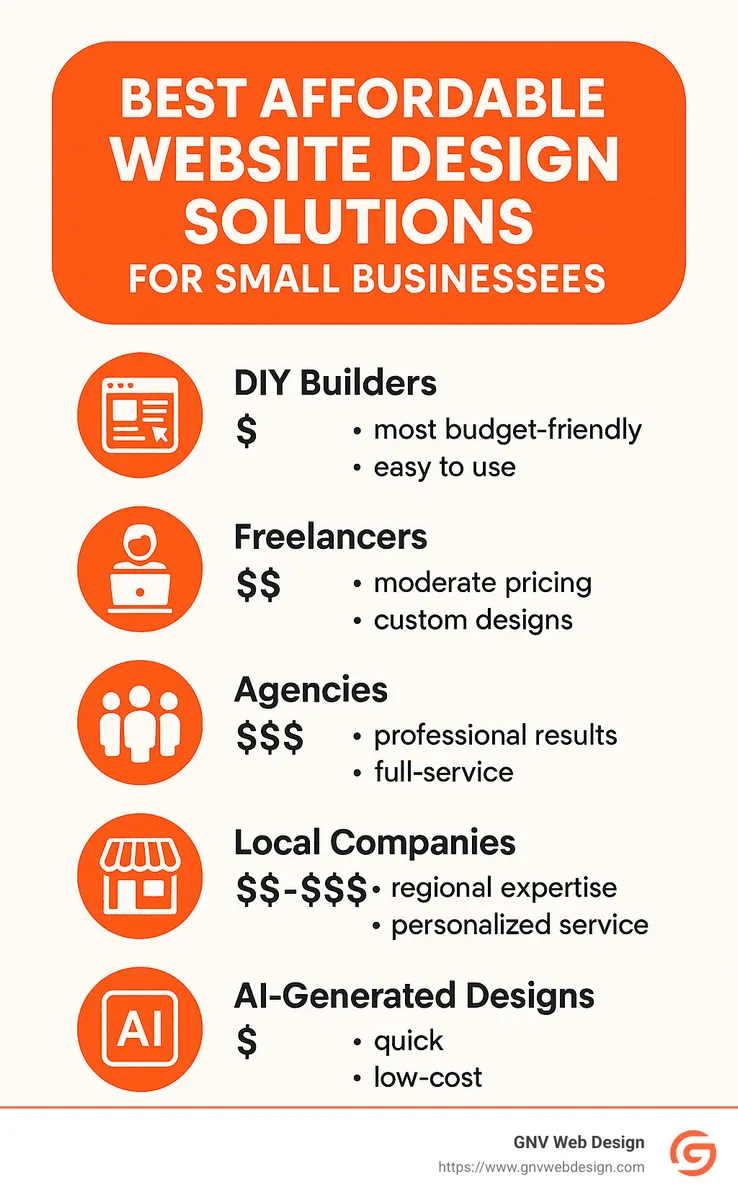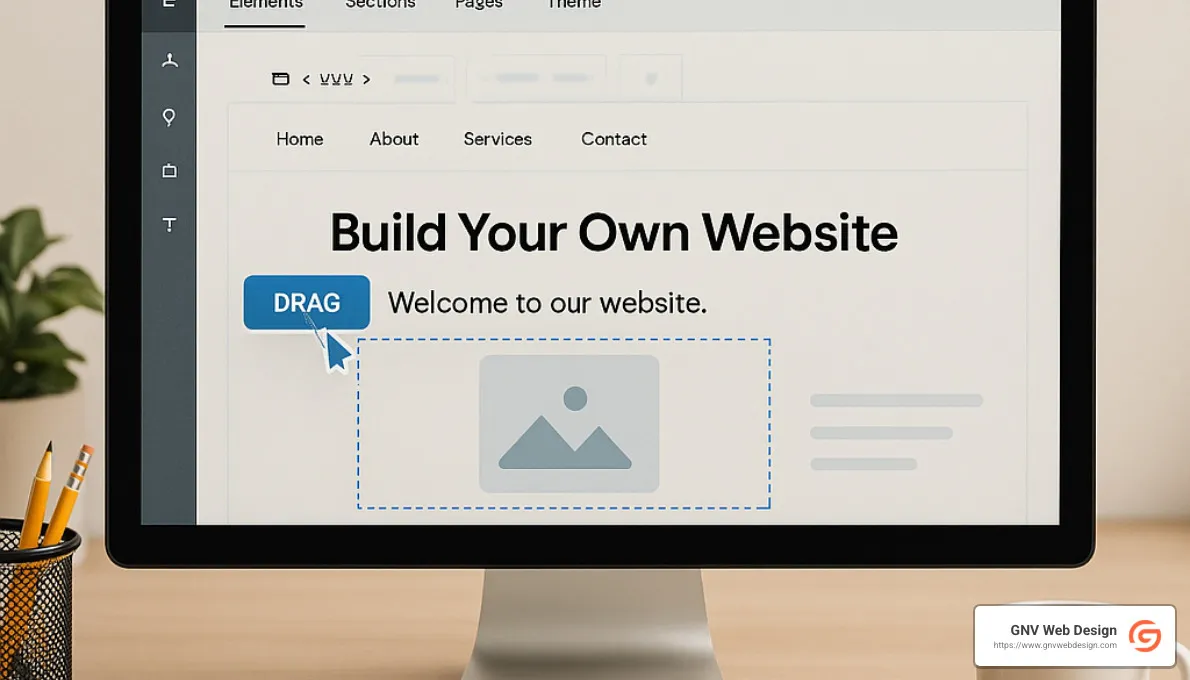The Bottom Line: Here's Where to Find Affordable Website Design for Small Business
Affordable website design for small business is all about balancing cost, quality, and ease-of-use. Luckily, there are several great options available right now:
- DIY Website Builders: Wix, Squarespace, and Hostinger ($9–$16/month)
- Freelance Designers: Cost-effective, personalized (one-time fee, typically $500–$2,000)
- Affordable Web Design Agencies: Professional, custom solutions ($2,000–$5,000 packages)
- Local Web Design Companies: Customized service and local support ($1,000–$4,000)
- AI-Powered Solutions: Fast, efficient, AI-built websites at low monthly prices ($2.99/month+)
Your business needs a website to compete online. But you also need to be smart with your budget—especially if times are tight. The good news: you absolutely don't need to spend thousands to get a fast, attractive, SEO-friendly website that actually works.
In this roundup, we've looked at dozens of affordable website design options. We've chosen the best budget-friendly options that will help your small business do better online—without breaking the bank.
In case you're short on time, here's an infographic summarizing the top options:

Why Affordable Website Design Matters for Small Businesses
Your customers are online—and if your small business isn’t there to meet them, you’re missing out. Forbes puts it simply: "One of the main reasons you should have a website for your business is to increase your organization's credibility."
But let’s be real: building a website can feel intimidating, especially when you're working with tight budgets and limited resources. That's exactly why affordable website design for small business matters—not just because it keeps costs down, but because it helps you invest your money wisely.
Think of a well-designed website as your tireless, 24/7 employee: it greets your visitors, introduces your products or services, answers questions, and even helps close sales—without ever taking a coffee break!
And the benefits don't end there. An affordable, professional website gives your business increased online visibility, allowing customers to find you when they're searching for products and services you offer. Did you know that 97% of consumers search online to find local businesses? Without a website, your business is virtually invisible to these potential new customers.
Having a polished, professional online presence also gives your brand instant credibility. Even if you're operating out of your garage (hey, we’ve all been there!), a well-designed website makes your business look trustworthy and professional. Plus, it offers multiple avenues for customer engagement, making it easy for people to connect with your business, learn about your offerings, and make purchases.
Perhaps most importantly, having an affordable yet effective website provides a critical competitive advantage. Let's face it: your competitors are already online. If you're not there too, you might as well personally deliver new customers straight into their waiting arms.
Here at GNV Web Design, we see these benefits play out all the time. One of our Gainesville-based clients, a local coffee shop owner, recently shared with us: "I was shocked at how many new customers mentioned finding us through our website. It's literally paying for itself every month."
Still, we get it—budgets are tight. Especially in 2024, with so many unpredictable costs and shifting consumer demands, every penny counts. That's why finding the sweet spot between cost and quality is essential for small businesses trying to grow online.
Affordable website design isn’t about doing it cheap; it's about doing it smart. By prioritizing your investment and choosing the right type of website design for your needs, you set your business up for success—today and years down the road.
Ready to dive deeper into what an affordable website should include? Check out our handy guide on The Best Small Business Website Packages: A 2025 Guide.
Affordable Website Design for Small Business: Top 5 Options in 2025
Option 1: DIY Website Builders

If you've got a bit of a DIY spirit and a tight budget, website builders might be your perfect match. These user-friendly platforms have revolutionized how small businesses get online without breaking the bank.
Think of website builders as digital Lego sets for your business. They provide ready-made templates and intuitive drag-and-drop tools that let you create a professional-looking website without writing a single line of code. You can add your content, customize designs, and even set up a simple online store—all by yourself, even if you're not particularly tech-savvy.
In 2025, several platforms stand out for affordable website design for small business needs. Wix remains a favorite, starting around $16/month (and don't forget to use discount code TAKE10 for 10% off). What makes Wix shine is its incredibly intuitive editor, massive template library with over 800 options, and robust app marketplace. The only real downside? Once you've chosen a template, switching to a different one can be tricky.
Squarespace is another solid option with personal plans at $16/month. Their templates are simply gorgeous—perfect for photographers, restaurants, or any business where aesthetics matter. The trade-off is slightly less flexibility and a bit steeper learning curve than some competitors.
For the ultra-budget-conscious, Hostinger's website builder starts at just $2.99/month. While it offers fewer templates than premium options, it includes some impressive AI tools that can even generate site content for you. Plus, the built-in heatmap analytics help you understand exactly how visitors interact with your pages.
Square Online deserves mention for its free plan (you only pay transaction fees on sales), while Jimdo offers simplicity with AI-powered creation starting at $9/month.
A client of ours who runs a small bookkeeping service told me recently: "I started with Wix because I couldn't afford a designer. Three years later, I'm still using it because it does everything I need, and I can update it myself in minutes. Best business decision I ever made."
DIY website builders are perfect if you're a solopreneur just starting out, if you want complete control over your site updates, or if you simply need a basic informational site without complex features. They're the most affordable option upfront, though the monthly subscription costs do add up over time.
Option 2: Hiring Freelance Web Designers
When template websites feel too cookie-cutter but agencies seem financially out of reach, freelance web designers offer that sweet spot in between. They provide more personalization than templates without the agency price tag.
Freelancers are independent professionals who specialize in creating websites. Working with one feels more like a partnership than a service—you're collaborating directly with the person designing your site, not communicating through account managers or teams.
The cost difference between freelancers and agencies can be substantial. While a freelancer typically charges between $500-$2,000 for a small business website, agencies often start at $5,000 and can easily climb past $10,000. That said, there are trade-offs to consider beyond just price.
With freelancers, you get high personalization through direct contact with your designer, but support might be limited to the project timeframe. Agencies offer more comprehensive support but often involve multiple team members. Freelancers usually deliver faster but reliability can vary by individual, while established agencies tend to be more consistent.
Finding quality freelancers isn't difficult if you know where to look. Platforms like Upwork and Fiverr host thousands of designers (tip: filter for those with 4.8+ star ratings). For more curated options, creative showcase sites like Behance and Dribbble let you browse portfolios first. Local business networking groups can also lead to hidden gems in your area.
When working with freelancers, clear communication is key. Always check their portfolio and client testimonials before hiring. Get everything in writing—deliverables, timeline, payment terms, and ownership rights. And be sure to discuss what happens after the initial build. Will they be available for updates? At what cost?
A restaurant owner in Ocala shared her experience: "I hired a freelancer who specialized in restaurant websites. She charged me $1,200 for a site that would have cost $5,000 at an agency. The best part was that she really understood my business needs and didn't try to upsell me on features I didn't need. She even took custom photos of our food!"
The freelance route offers excellent value, especially if you find someone whose style matches your vision. You'll make a one-time investment rather than paying monthly fees, and you'll get something more unique than a template site.
Option 3: Affordable Web Design Agencies

Web design agencies aren't just for big businesses with massive marketing budgets. Many agencies now offer small business packages that deliver professional results without the enterprise-level pricing.
What makes an agency "affordable" isn't just lower prices—it's smarter pricing structures. These agencies have typically streamlined their processes to deliver websites efficiently. They might offer fixed-price packages instead of open-ended hourly billing. Some use customized templates as starting points rather than building everything from scratch. Most importantly, they understand small business constraints and focus on delivering what you actually need, not what looks impressive in their portfolio.
"You can have a professional website (not templated), optimized, mobile ready, and hosted on dedicated servers in as little as 3 weeks." This promise from one service provider captures what makes affordable agencies attractive—they balance quality, speed, and cost.
Most affordable agencies offer small business packages in the $2,000-$5,000 range. For this investment, you can expect a custom design (not just a template), mobile-responsive layouts that look great on phones and tablets, basic SEO optimization to help customers find you, a content management system (typically WordPress) that lets you make basic updates yourself, and training on how to use it.
These agencies shine for established small businesses that need a truly professional online presence but don't have the time or interest in DIY solutions. They're also perfect if you need specific functionality that goes beyond what templates offer, or if you want ongoing support and maintenance.
A local Gainesville accounting firm told us about their experience: "We wanted something that looked truly professional and worked seamlessly. The agency we chose delivered exactly what we needed for about $3,500—much less than we expected to pay for that level of quality. Plus, they're there when we need help or updates."
While agency services require a higher upfront investment than DIY options, they often provide excellent long-term value. You're not just paying for a website—you're investing in expertise, support, and peace of mind.
Option 4: Local Web Design Companies
There's something special about working with people who understand your community. Local web design companies combine the professionalism of agencies with the personal touch of freelancers, plus they bring invaluable knowledge of your specific market.
At GNV Web Design, we've seen how important local understanding can be when designing websites for businesses in Gainesville, Tampa, Jacksonville, Tallahassee, and Ocala. We don't just know web design—we know the local customers, competitors, and market conditions that affect our clients' success.
The benefits of choosing a local web design company go beyond just convenience. They understand what works in your specific community because they're part of it. Face-to-face meetings are possible, which often leads to better communication and results. Your dollars stay in the local economy, supporting other businesses like yours. Local companies are invested in building long-term relationships since their reputation depends on local success stories. And when you need help, you won't be dealing with different time zones or delayed responses.
A client from Tallahassee shared her experience: "Having a web designer who knows our city has been invaluable. They understood our target demographic immediately and even suggested local SEO strategies we hadn't considered. They knew exactly which neighborhoods to target and even which local events would be good for promotions."
Local web design companies typically charge between $1,000-$4,000 for small business websites—positioning them in the middle of the affordability spectrum. What you get for that investment is more personalized service than large national agencies can provide, ongoing support from people you can actually meet for coffee, and local SEO expertise specific to your market.
This option offers a balanced approach to affordable website design for small business needs—you're making a mid-range investment but getting high value from that local expertise and relationship.
Option 5: AI-Powered Website Design Solutions

The newest kid on the block in affordable website design for small business is AI-powered solutions, and they're changing the game in terms of both cost and speed.
These cutting-edge tools use artificial intelligence to generate complete websites based on your business information, preferences, and goals. The process is remarkably simple: you provide basic information about your business, the AI generates a complete website design, you can tweak elements as needed, and then the site is published—often in minutes rather than days or weeks.
Hostinger's AI Website Builder starts at just $2.99/month and can generate a complete site in under a minute. Wix ADI (Artificial Design Intelligence) is included with regular Wix plans and asks you a series of questions before creating a customized site. 10Web's AI Website Builder starts at $10/month and can even clone existing sites with AI improvements. Jimdo Dolphin, included with Jimdo plans, specializes in ultra-fast site creation for small businesses.
One small business owner in Jacksonville couldn't believe the results: "I was skeptical about an AI building my website, but I was amazed at what it created. It asked me questions about my lawn care service, and within 60 seconds, I had a professional-looking site that seemed like it was custom-designed for my business. My customers love it, and I spent less than $50 to get it up and running."
The advantages are clear: these solutions are extremely affordable, incredibly fast, produce surprisingly good designs custom to your industry, and remain easy to update and maintain. Of course, there are trade-offs. AI-generated sites won't have the uniqueness of fully custom designs. They may offer limited advanced functionality compared to professionally developed sites. And you might need to make some adjustments to truly capture your brand's personality.
For many small businesses, though, the value proposition is compelling. When you need a professional online presence without spending thousands or waiting weeks, AI website builders deliver an impressive solution at a price point that's hard to beat.
This option earns top marks for affordability, combining very low costs with minimal time investment—a winning combination for busy entrepreneurs on a budget.
Essential Features to Look for in an Affordable Website Design
When you're on the hunt for affordable website design for small business, it can be tempting to cut corners and skip some important features to save a few bucks. We get it—budgets matter! But trust us: certain features are non-negotiable, even if you're trying to keep costs down. Here's our no-nonsense guide to the must-have elements for your small business website:
1. Mobile Responsiveness
Did you know that over 60% of internet searches happen on mobile devices? That's right—most people are browsing your website from their phones or tablets—not their desktop computers. A mobile-responsive website adjusts seamlessly to fit different screen sizes, giving your customers an easy, frustration-free experience.
So when you're choosing an affordable website design solution, make sure it includes a layout that automatically adapts to different devices. Look for designs that provide touch-friendly menus, readable text without pinching and zooming, and fast load speeds on mobile networks. Trust us—customers don't stick around long if your site takes forever to load or doesn't look good on their phones.
2. SEO Optimization
Even if your site looks amazing, it'll only help your business if people can actually find it. That's where SEO comes in. SEO (short for Search Engine Optimization) ensures your website shows up on Google and other search engines when potential customers look for businesses like yours.
Any good affordable website design for small business should include the basics of SEO optimization, such as proper heading structures (H1, H2, H3), customizable meta titles and descriptions, clean and simple URLs, image alt text, and optimized site loading speed.
At GNV Web Design, we always tell our clients that having a beautiful website that no one can find is like throwing a great party but forgetting to send out invitations. Make sure your affordable website includes these SEO essentials to help drive traffic and customers your way.
3. User-Friendly Interface
Here's the truth: visitors won't stick around if your website is confusing or hard to steer. Your website's job is to make it easy for people to find what they're looking for—whether that's your contact information, services, or how to place an order.
A good user interface includes clear navigation menus, logical and intuitive site structure, fast loading times (under 3 seconds), and easy-to-find contact details. If visitors struggle to find basic information, they'll quickly head elsewhere. Plus, a user-friendly site isn't just better for customers—it's easier for you as the site owner. Updating your content shouldn't feel like solving a complicated puzzle!
4. Scalability
Right now, you might only want a basic website to establish your online presence. But your small business won't stay small forever (fingers crossed!). As your business grows, your website needs to keep up.
When choosing an affordable website solution, look for scalability—meaning your site can easily expand and evolve with your business. You should be able to add new pages, upgrade features, and integrate with other tools like email marketing or CRM systems without completely rebuilding your site. If you're stuck with a rigid solution now, you'll pay big bucks for renovations down the road.
Want to dive deeper into the best scalable options? Check out our in-depth guide The Best Small Business Website Packages: A 2025 Guide for more insights.
5. Security Features
Website security isn't an optional add-on—it's a must-have, even on a budget. The last thing your small business needs is a hacked website or customer data breach. Good security protects both your customers and your reputation.
At minimum, your affordable website design should include basic security features, such as an SSL certificate (that's the little lock symbol and https:// in your browser), regular software updates, secure forms and data handling, and reliable backup solutions.
As we often remind our clients at GNV Web Design: it's better to have a simple, secure, and functional website than a flashy one that puts your business at risk.
Affordable website design doesn't mean giving up essential features. By making sure your new website checks these five boxes—mobile responsiveness, SEO optimization, user-friendly interface, scalability, and security—you'll set your small business up for online success without breaking the bank.
Hidden Costs to Watch Out For
When looking for affordable website design for small business, it's easy to get excited about low upfront prices—but those attractive initial costs sometimes hide unexpected expenses down the road. These sneaky extras can quickly pile up, turning a seemingly affordable solution into a budget headache. Here's what you need to know (so you don't get caught by surprise!).
1. Domain Registration Fees
Your domain name is your online address—think of it as your digital storefront sign. Domain registration fees are usually pretty reasonable, starting around $10–$20 per year. Sounds great, right? But here's the catch: many providers offer a discounted domain for your first year, then hike the price significantly upon renewal. Some also tack on extra fees for privacy protection (which keeps your contact details private from spammers).
Our advice? Before committing, ask specifically about renewal prices and privacy protection fees. Many affordable website design packages offer a free domain for your first year, but make sure you're aware of renewal fees. No one likes surprises—especially when they involve your wallet!
2. Hosting Costs
Think of hosting as the rent you pay to keep your website live on the internet. Shared hosting is the cheapest option, typically between $3–$10 per month. Managed WordPress hosting costs a bit more—around $15–$30 per month—but offers better performance and security. VPS or dedicated servers cost even more, ranging from $30–$100+ monthly, but they're usually not needed for small businesses just starting out.
Here's the important thing to keep in mind: extremely cheap hosting often comes with slower speeds, poor reliability, and weaker security. Make sure to choose a hosting package that balances affordability with solid performance and security. It's a small price to pay to keep your customers happy (and your business safe!).
3. Transaction Fees
If your website will include an online store, remember this: "free" ecommerce isn't always free. Transaction fees can quickly add up, taking a significant bite out of your profits.
Most payment processors charge a standard fee—usually around 2.9% + $0.30 per transaction—which is normal. But here's the kicker: some ecommerce platforms tack on extra fees on top of that, especially with free or low-cost plans. One small business owner we know learned this the hard way: "I picked the free ecommerce plan, thinking I'd save money, but ended up paying almost 5% on every sale. It really ate into my profit margins!"
To avoid this, always read the fine print carefully. Make sure you're clear on all platform fees and payment processing costs upfront. That way, there won't be any painful surprises cutting into your earnings.
4. Maintenance Expenses
A website isn't a "set-it-and-forget-it" situation—it's more like a garden that needs regular care to stay healthy and secure. Many business owners underestimate ongoing maintenance costs, including regular security updates, renewing plugins or extensions, technical support, and content updates.
If you’re comfortable doing these tasks yourself, that's fantastic! But if not, you'll need to budget for professional help. Either way, it's important to include website maintenance costs in your initial planning. At GNV Web Design, we tell our clients: "A website is never truly done. It's an ongoing investment in your business's online health."
5. Upgrade Charges
Here's something else many business owners don't see coming: the cost of upgrading your website as your business grows. Adding new functionality or features later often costs much more than including them from the start. Moving from a DIY platform to a custom site can also require a costly rebuild. Redesigning your site later generally costs between 50%–75% of your original investment.
One of our clients shared her own cautionary tale: "I started with a DIY website to save money. But when I wanted to add online booking, I had to completely rebuild the website. Looking back, I wish I'd invested in a more flexible solution from day one."
The bottom line? Consider your long-term business needs up front. If you think you'll need extra features soon, it's usually cheaper—and smarter—to include them in your initial build.
By being aware of these hidden costs upfront, you can make smarter decisions about your affordable website design for small business—and avoid unpleasant surprises down the road. That way, your online presence stays budget-friendly both now and in the future.
How to Balance Cost and Quality in Website Design
When it comes to affordable website design for small business, finding the sweet spot between cost and quality can feel a bit like trying to balance on a tightrope. Lean too much towards budget, and you risk ending up with a site that doesn't meet your needs. Overspend, and you're left wondering if the investment was worth it.
Here's how you can make smart, budget-savvy choices without sacrificing quality:
1. Prioritize Features Based on Business Goals
Before you even look at a single website builder or speak with a designer, take a moment to clearly define your primary business goals. Ask yourself, "What do I really need my website to accomplish?"
If your main goal is generating leads, you'll want to prioritize clear, eye-catching contact forms and calls-to-action. If you're focused on online sales, you'll need to make sure your site has strong e-commerce functionality and user-friendly product displays. Simply sharing information? Focus your efforts (and budget!) on good content organization and readability. And if you're building your brand, allocate your resources toward professional design and visual elements that reflect your business’s personality.
By clarifying your goals upfront, you'll spend your money wisely on what's most important, rather than wasting budget on bells and whistles you don't really need.
2. Think Long-Term Value, Not Just Upfront Cost
We get it—when you're watching your small business budget closely, that initial price tag can be intimidating. But try to remember that your website isn't just a one-time expense; it's a long-term investment in your business’s success.
Rather than focusing solely on the upfront cost, consider the bigger financial picture. Ask yourself:
- How much time will I save by choosing a professional option rather than struggling through DIY?
- What's the real cost of lost business if my website doesn't perform well or look professional to visitors?
- How quickly might I outgrow a cheap solution that can't scale with my business?
As we always remind our friends at GNV Web Design, "The cheapest option today isn't always the most affordable in the long run." Sometimes, investing a little more upfront can pay huge dividends over time.
3. Start Simple, But Plan for Growth
You don't need every fancy feature right out of the gate (trust us on this). It's perfectly fine to start your website journey with a solid, simple foundation. But here's the key: choose a website design solution that allows for easy expansion down the road.
Begin with your core pages and essential features. Pick a flexible platform—like a user-friendly CMS such as WordPress or Wix—that allows you to add functionality later without completely rebuilding. A phased approach lets you stick to your current budget, then gradually improve your website as your business grows.
4. Consider Total Cost of Ownership
Your website investment isn't just the initial fee you pay your web designer or the monthly fee you're charged to use a site builder. Make sure you're looking at the full cost of your website over the next two to three years.
Factor in ongoing expenses like monthly or annual hosting fees, domain registration and renewal, maintenance and security updates, and even the time you'll spend managing and updating your site. A cheap upfront deal can end up costing a lot more in hidden fees and headaches.
5. Leverage Expert Advice
Even if you're leaning towards a DIY solution, getting a little professional guidance at the outset can save you a ton of hassle (and cash!) in the long run. Many web designers and agencies, like our team at GNV Web Design, offer hourly consulting services specifically for small businesses.
You can use just an hour or two of expert advice to strategically plan your website structure, user experience, and essential features. Even a brief consultation can help you avoid costly mistakes and give you clear direction, so you're not spinning your wheels later.
One Ocala restaurant owner shared with us, "I spent $200 for a one-hour consultation before starting my DIY site. Honestly, it saved me weeks of trial and error and probably hundreds of dollars I would've wasted on wrong decisions."
Balancing quality and cost isn't about choosing the cheapest or most expensive option. It's about being intentional with your choices, clearly defining your business goals, and understanding the long-term value your website delivers. With a bit of upfront planning, you really can achieve great, affordable website design for small business without breaking your budget.
Frequently Asked Questions about Affordable Website Design for Small Businesses
How Much Should a Small Business Expect to Pay for a Professional Website?
The cost of affordable website design for small business varies quite a bit, depending on your goals, needs, and how you choose to get your site built.
If you're going with DIY website builders like Wix, Squarespace, or Hostinger, you can expect to pay between $9–$30 per month (around $108–$360 per year). These builders are great if your budget is tight and you're willing to roll up your sleeves.
Hiring a freelance web designer typically runs between $500–$2,500 for a basic five-page site. Freelancers offer the advantage of personalized attention and custom designs at a fraction of agency costs.
If your small business needs something more comprehensive and professionally polished, an affordable web design agency typically charges between $1,500–$5,000. These packages usually include custom designs, SEO optimization, and mobile-responsive layouts.
Choosing a local web design company combines personalized service with local-market expertise, usually priced between $1,000–$4,000 depending on your site's complexity and features.
Finally, AI-powered website builders are the newest and most affordable option, starting at just $3–$15 per month (around $36–$180 per year). These solutions are perfect for businesses that need a quick, budget-friendly website without extensive customization.
Pricing will also depend on factors like the number of pages, custom vs. template designs, e-commerce functionality, special programming, content creation (like writing, photography), and the depth of SEO optimization you choose.
Should Small Businesses Use Free Website Plans or Invest in Paid Options?
Ah, the tempting allure of free—it sounds perfect, doesn't it? But before you jump at the chance to grab a free website, consider the limitations that come with them.
Free website plans usually have major drawbacks, like branded subdomains (for example, "yoursite.wixsite.com" instead of "yoursite.com"), third-party ads on your site, limited storage and bandwidth, fewer templates and customization options, and often restricted functionality. If you're selling online, these plans typically charge higher transaction fees, too.
Paid website options, on the other hand, offer significant advantages. You'll get a professional appearance with your own custom domain, no annoying third-party advertising, access to complete features and customization, better performance, and reliable customer support.
Our advice? Free plans can be fine for short-term experiments or hobby projects. But if you're serious about your business, invest in at least a basic paid plan. We had a local client in Gainesville who tried a free plan first, then upgraded within a month. His reaction? "The difference in how clients perceived my business was immediate and dramatic." Investing a few dollars each month significantly boosts your professional credibility and the long-term value of your website.
How Can Small Businesses Measure the ROI of Their Website Investment?
One of the most common questions we get at GNV Web Design is, "How do I know if my website was worth the cost?" Measuring the return on investment (ROI) of your website isn't as complicated as it sounds—and it's crucial for understanding the value your website brings to your business.
Some key metrics you should track include website traffic (how many visitors are you attracting?), conversion rate (what percentage of visitors actually do something important, like fill out a form or make a purchase?), lead generation (how many people contact you directly from your site?), online sales (direct revenue from e-commerce), and cost per customer acquisition (how much it costs you to get each new customer).
Wondering how to practically track these metrics? Google Analytics is your best friend here. You can also simply ask new customers how they found you, use unique phone numbers or special forms on your website, create coupon codes exclusive to your site, or compare your business performance before and after launching or improving your website.
For instance, we heard from one of our Jacksonville-based clients recently who said, "We got a new customer today directly because of our website. He told us he found us on Google, checked out our site, and decided we were the best choice." That's exactly the kind of measurable result you want.
Typically, you can expect to see increased website traffic within 1–3 months, more leads within 2–4 months, revenue growth within 3–6 months, and a full return on your investment within 6–12 months.
At GNV Web Design, we provide our clients with monthly analytics reports that clearly show how their websites are performing over time—because seeing measurable results is one of the best parts of investing in an affordable website design for small business.
Making the Right Choice for Your Business
When it comes to choosing the best affordable website design for small business, one size definitely doesn't fit all. Your ideal choice depends heavily on your business goals, budget, and personal preferences. Let's talk through each option briefly so you can confidently choose the right one for your unique situation.
If you're working with a tight, shoestring budget and don't mind rolling up your sleeves, DIY website builders are an excellent starting point. Many small businesses we know have built beautiful, functional websites using platforms like Wix, Squarespace, and Hostinger. DIY solutions work particularly well if you're looking to create a simple, informational site, you want full control over updates, and you actually enjoy tinkering with technology. Plus, they're easy on the wallet, typically costing between $9 and $16 per month.
On the other hand, if you're craving a website with a bit more personality but still need to keep an eye on your budget, consider working with a freelance web designer. Freelancers bring a personal touch to your project, giving you direct communication and customized design without the hefty price tag of big agencies. Pricing typically ranges from $500 to $2,000, making this a solid mid-range option that gives you customization beyond DIY templates.
But let's say you want professional results without the hassle of building the website yourself or managing a freelancer. In that case, an affordable web design agency might be your best bet. These agencies provide comprehensive solutions, including custom designs, mobile responsiveness, and built-in SEO optimization, usually priced between $2,000 and $5,000. Agencies work especially well if your business requires specific functionality, ongoing support, or you just prefer having a specialized team behind you.
Now, if you're someone who values face-to-face interaction and has a heart for supporting local businesses, partnering with a local web design company (like us here at GNV Web Design) could be perfect. Local designers understand your community, your market, and your customers in ways that larger firms can't always match. These relationships often offer faster response times, personalized support, and valuable long-term partnerships. Pricing typically falls in the affordable range of $1,000 to $4,000, depending on your site's complexity.
Lastly, if you're intrigued by cutting-edge technology, need a site fast (we're talking minutes rather than weeks), and are working within a truly tight budget, you might want to explore AI-powered website design solutions. These tools, such as Hostinger's AI Website Builder or Wix's ADI, use artificial intelligence to create surprisingly good websites instantly based on your preferences. They're extremely budget-friendly (as low as $2.99/month), but expect some limitations in uniqueness and advanced features.
Still weighing your options? Here's a handy, quick-reference summary to help clarify things at a glance:
- DIY website builders: Best for tight budgets, simplicity, and hands-on control.
- Freelance designers: Ideal if you want personalized service, moderate budget, and direct communication.
- Affordable agencies: Perfect for professional quality, specific functionality, and ongoing support.
- Local web design companies: Great if you value local expertise, face-to-face interactions, and community-focused partnerships.
- AI-powered solutions: Excellent if you need a quick, budget-friendly, tech-driven solution.
Whichever route you choose, investing in affordable website design for small business isn't just a one-time expense—it's about setting your business up for long-term online success. At GNV Web Design, we've helped countless small businesses in Gainesville and beyond find the perfect balance between affordability, quality, and effectiveness.
If you're still unsure, no worries—reach out to us anytime. We're always happy to chat, offer guidance, and make sure you're getting exactly what your business needs.





